Maintaining a clean and safe swimming area in your South African home requires proper pool water maintenance. By following these essential tips, you can ensure a pristine pool that upholds hygiene and safety standards for you and your family.
Key Takeaways:
- Regularly skim leaves and debris from the pool to prevent algae build-up.
- Scrub the pool walls and floor to remove any signs of algae.
- Clean the pool filter weekly and backwash the system pipes monthly for optimal filtration.
- Conduct weekly water tests to maintain proper chemical levels.
- Control alkalinity using baking soda and shock the pool to remove contaminants periodically.
- Ensure proper water levels and use a tennis ball to absorb oils.
- Power wash the pool deck to keep it clean and schedule a yearly service appointment with a professional.
By incorporating these maintenance tips, you can enjoy a pristine and well-maintained swimming pool in your South African home. Remember to properly winterize the pool at the end of the season for its longevity.
Skimming and Scrubbing to Prevent Algae Build-up
Skimming leaves and debris from your pool daily and regularly scrubbing its sides are essential pool water maintenance techniques to prevent algae build-up. In South Africa, where the weather can be hot and humid, keeping your swimming pool clean and hygienic is crucial for both the aesthetics and safety of your swimming area.
To ensure that your pool remains pristine, it’s important to skim the water surface every day using a leaf skimmer or net. This will remove leaves, insects, and other debris that can accumulate and promote the growth of algae. By regularly skimming your pool, you can maintain its cleanliness and prevent the water from turning green.
In addition to skimming, scrubbing the sides of your pool is equally important in preventing algae build-up. Algae can form on the walls and floor of your pool, making it slippery and unhygienic to swim in. Using a pool brush, gently scrub the walls and floor to remove any algae or residue. This will not only keep your pool looking clean but also help maintain its overall hygiene and safety.
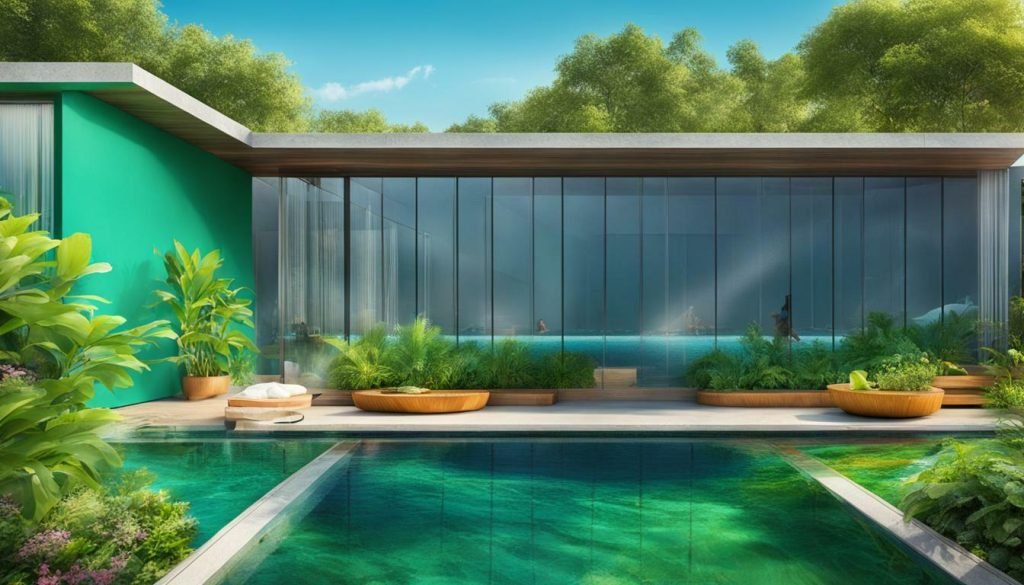
Remember, regular skimming and scrubbing are key to preventing algae build-up and maintaining a pristine swimming area in your South African home.
By incorporating these simple pool cleaning techniques into your regular maintenance routine, you can ensure that your pool stays algae-free and enjoyable throughout the year. Regular skimming and scrubbing, along with proper filtration and water chemical balance, are essential for the longevity and cleanliness of your pool.
Pro Tip: Tennis Ball Trick
Another handy tip to keep in mind is to use a tennis ball in your pool. Simply toss a tennis ball into the water and let it float around. The tennis ball will absorb oils and lotions, preventing them from clouding the water and clogging the filters. This easy trick can help in maintaining the water’s clarity and cleanliness.
Regular Filter Cleaning and Backwashing
Regularly cleaning your pool filter and performing monthly backwashings are crucial steps in maintaining clean and properly functioning pool equipment. Over time, debris, dirt, and other particles can accumulate in the filter, hindering its ability to effectively clean the water. By establishing a routine for filter cleaning and backwashing, you can ensure optimal filtration and prevent issues such as green water and broken filters.
To clean your pool filter, start by turning off the filter and closing the skimmer valves. Remove the filter cartridge or grid assembly, and use a hose to spray off any debris and build-up. Be thorough in cleaning all components of the filter, including the housing and O-rings. If necessary, use a filter cleaner solution to remove any stubborn dirt or oils. Rinse the filter thoroughly and reassemble it according to the manufacturer’s instructions.
In addition to regular filter cleaning, monthly backwashing is necessary to remove trapped debris and prevent pressure build-up in the system. To backwash your pool filter, start by turning off the filter and closing the skimmer valves. Set the filter valve handle to the “backwash” position and turn the filter back on. Allow the water to run until it becomes clear in the sight glass or waste pipe. Once the water runs clear, turn off the filter, set the valve back to the “filter” position, and turn the filter back on.
| Pool Equipment Maintenance Checklist: | Recommended Frequency: |
|---|---|
| Filter cleaning | Weekly |
| Backwashing | Monthly |
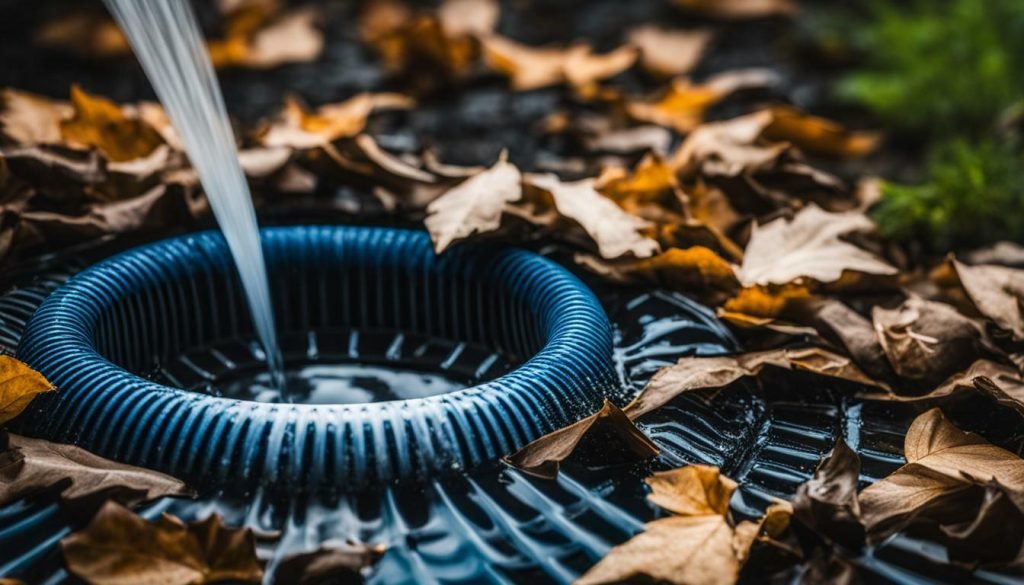
Quick Tips:
- Be sure to check the filter manufacturer’s guidelines for specific instructions on cleaning and backwashing.
- Keep a log or calendar to track when you last performed filter cleaning and backwashing to ensure consistency.
- Inspect the filter regularly for signs of damage or wear, such as cracks or tears. Replace any damaged parts promptly.
Testing Water Chemistry for Optimal Balance
Testing the water chemistry of your pool on a weekly basis is vital to ensure optimal balance and hygiene. It allows you to maintain the appropriate levels of alkalinity, chlorine, acidity, and calcium hardness, which are crucial for the overall health of the pool water.
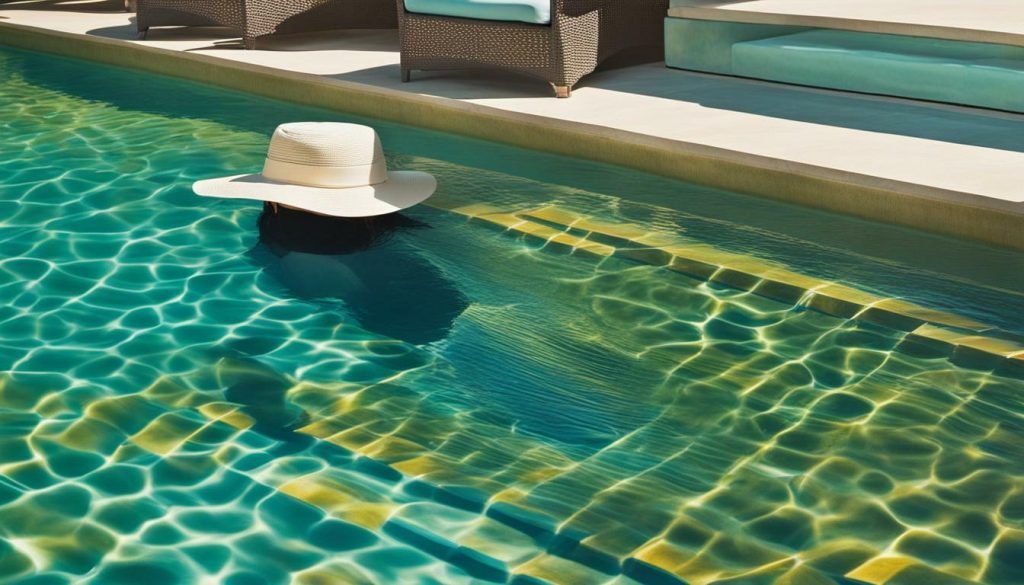
Start by using a reliable pool water testing kit that can assess multiple parameters. Test for cyanuric acid, free chlorine, acidity/alkalinity, total alkalinity, and calcium hardness. These tests will provide you with a comprehensive understanding of the water’s chemical composition and help you identify any imbalances or potential issues.
| Chemical Parameter | Ideal Range |
|---|---|
| Cyanuric Acid | 30-50 ppm |
| Free Chlorine | 2-4 ppm |
| Acidity/Alkalinity (pH) | 7.2-7.6 |
| Total Alkalinity | 80-120 ppm |
| Calcium Hardness | 200-400 ppm |
Once you have tested the water, make any necessary adjustments to bring the chemical levels within the ideal range. Consult a professional or refer to pool maintenance guides for the appropriate dosages of chemicals like pH increaser or decreaser, chlorine, and stabilizer.
By regularly testing and maintaining the water chemistry, you can prevent issues such as cloudy water, algae growth, or skin and eye irritations. Remember, a well-balanced pool is not only aesthetically pleasing but also safe and hygienic for everyone to enjoy.
Controlling Alkalinity and Shocking the Pool
Using baking soda to control alkalinity and periodically shocking your pool are essential maintenance steps to keep the water clear and balanced. Maintaining the right alkalinity levels is crucial for the overall health and cleanliness of your pool. Baking soda, also known as sodium bicarbonate, is a cost-effective and readily available solution for increasing alkalinity.
To use baking soda, simply measure the correct amount based on your pool’s capacity and sprinkle it evenly over the water’s surface. Allow the baking soda to dissolve and circulate for a few hours before retesting the alkalinity levels. Adjust as necessary to maintain the recommended range, typically between 80 and 120 parts per million.
Shocking the pool, on the other hand, is an effective way to eliminate contaminants and restore water clarity. Shock treatments introduce high levels of chlorine into the pool, which breaks down organic matter and kills bacteria. It is recommended to shock your pool at least twice a season or more frequently if you notice signs of algae or cloudy water.
When shocking the pool, follow the instructions provided by the manufacturer for the specific product you’re using. Maintain proper circulation and filtration during the process to ensure even distribution of the shock treatment. It’s important to note that swimming should be avoided until the chlorine levels return to the appropriate range, typically between 1 and 3 parts per million.
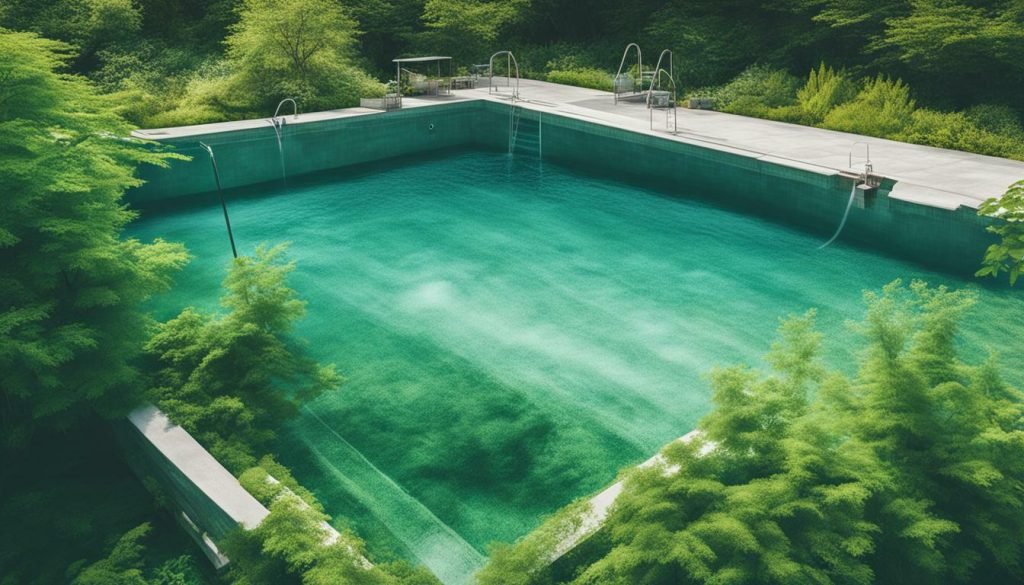
By regularly controlling alkalinity and shocking your pool, you can maintain a pristine swimming area in your South African home. Remember to test the water chemistry frequently and consult with a professional if you encounter any persistent issues. With proper maintenance, you can enjoy a safe and hygienic pool all year round.
Additional Maintenance Tips and Yearly Service
In addition to regular maintenance tasks, maintaining proper water levels, using a tennis ball to absorb oils, power washing the pool deck, and scheduling a yearly service with a professional are crucial for ongoing pool maintenance. By following these additional tips and seeking professional assistance, you can ensure the longevity and cleanliness of your pool.
To maintain proper water levels, regularly check and adjust the water level to prevent any damage to the pool pump and filter. Low water levels can cause the pump to run dry, leading to potential damage. On the other hand, high water levels can result in inefficient filtration. Maintaining the recommended water level ensures optimal performance and extends the lifespan of pool equipment.
Another helpful tip is to use a tennis ball to absorb oils that may accumulate on the water surface. Sunscreen, body oils, and other debris can create a thin layer on top of the pool water, affecting its clarity and cleanliness. Simply toss a tennis ball into the pool, and it will absorb the oils, leaving your pool water pristine and inviting.
Regularly power washing the pool deck is essential to prevent dirt, algae, and other contaminants from entering the pool. A clean pool deck helps to maintain the hygiene and cleanliness of the entire pool area. Power washing removes dirt and grime, preventing it from being carried into the pool by foot traffic or blowing winds. This simple step enhances the overall appearance of your pool and keeps it free from potential sources of contamination.
Lastly, scheduling a yearly service appointment with a professional is highly recommended. A qualified pool technician will conduct a thorough inspection of your pool, checking for any potential issues or maintenance needs. They can identify and address problems early on, preventing costly repairs in the future. Regular professional servicing ensures that your pool remains in optimal condition and provides a safe and enjoyable swimming experience for you and your family.
| Maintenance Tip | Description |
|---|---|
| Maintain proper water levels | Regularly check and adjust water level to prevent damage to pool equipment. |
| Use a tennis ball to absorb oils | Toss a tennis ball into the pool to absorb oils and maintain water clarity. |
| Power wash the pool deck | Clean the pool deck to prevent contaminants from entering the pool. |
| Schedule a yearly service | Book an appointment with a professional to ensure proper pool maintenance. |
By incorporating these additional maintenance tips and seeking professional assistance when needed, you can ensure that your pool remains in pristine condition. Enjoy a clean, safe, and inviting swimming experience in your South African home.
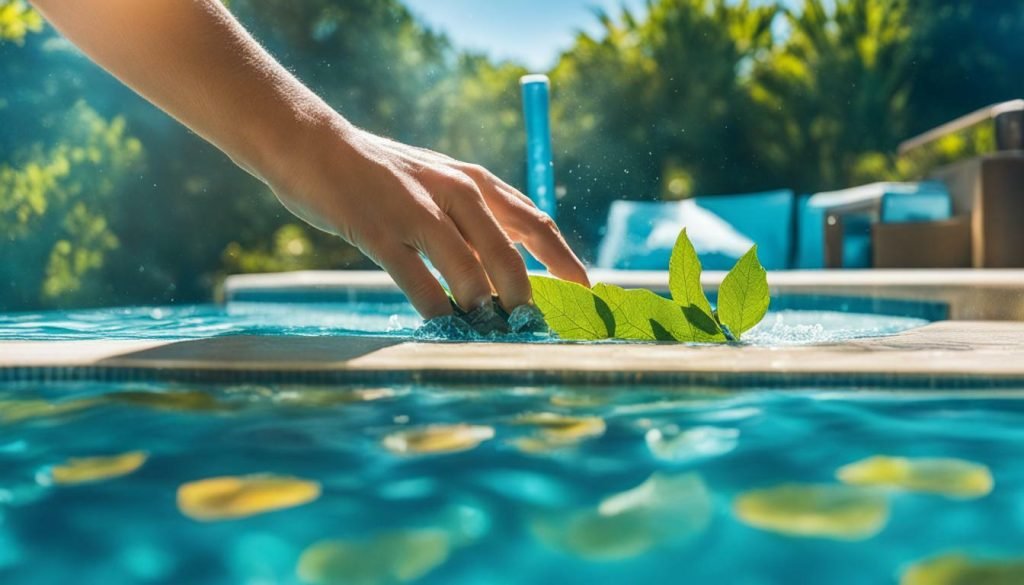
Conclusion
By incorporating these essential pool water maintenance tips, you can ensure a clean and enjoyable swimming experience in your South African home. Maintaining a pool in South Africa is crucial to avoid issues such as green water, broken filters, and algae build-up. Here are some key tips to keep in mind:
- Skim leaves and debris daily and scrub the sides of the pool: Regular skimming and scrubbing help prevent algae build-up and maintain a pristine swimming area. This simple step can go a long way in ensuring the hygiene and safety of your pool.
- Clean the pool filter weekly and backwash the system pipes monthly: Proper filtration is essential for maintaining water clarity. Regularly cleaning the pool filter and backwashing the system pipes will optimize filtration and prevent issues like green water and malfunctioning filters.
- Test the water for chemical levels weekly: Keep a close eye on the chemical balance of your pool water. Testing for cyanuric acid, free chlorine, acidity/alkalinity, total alkalinity, and calcium hardness helps maintain optimal water balance and prevents problems like cloudy water or skin irritations.
- Use baking soda to control alkalinity and consider shocking the pool twice a season: Baking soda can be a useful tool in maintaining proper alkalinity levels. Additionally, periodic shocking of the pool eliminates contaminants and ensures water clarity.
- Maintain the water level and use a tennis ball to absorb oils: Keep the water level at an appropriate height and use a tennis ball to absorb any oils or residue floating on the water surface. This helps maintain water cleanliness.
- Power wash the pool deck and schedule a yearly service appointment with a professional: Regularly power washing the pool deck not only keeps it clean but also prevents debris from entering the pool. Additionally, scheduling a yearly service appointment with a professional ensures thorough maintenance and addresses any potential issues.
- Properly winterize the pool at the end of the season: Before the colder months arrive, make sure to properly winterize your pool. This includes draining and cleaning the pool, protecting the equipment, and covering the pool to prevent debris accumulation.
By following these essential pool water maintenance tips, you can enjoy a crystal-clear and safe swimming experience in your South African home. Regular upkeep and care will help preserve the longevity of your pool and provide a hygienic environment for your family and friends to enjoy.
FAQ
Why is it important to maintain pool water in South Africa?
Maintaining pool water in South Africa is important to avoid issues like green water, broken filters, and algae build-up. It ensures a pristine swimming area for hygiene and safety.
How often should I skim and scrub the pool?
Skim leaves and debris daily and scrub the sides of the pool regularly to prevent algae build-up and maintain a clean swimming environment.
How often should I clean the pool filter?
It is recommended to clean the pool filter on a weekly basis to ensure optimal filtration and prevent issues like green water and broken filters. Additionally, backwash the system pipes monthly.
What chemical levels should I test for in the pool water?
It is important to test the water for chemical levels weekly. This includes measuring cyanuric acid, free chlorine, acidity/alkalinity, total alkalinity, and calcium hardness.
How can I control alkalinity and shock the pool?
You can control alkalinity using baking soda and consider shocking the pool twice a season to remove contaminants and maintain water clarity.
Are there any additional maintenance tips?
Yes, in addition to regular skimming and cleaning, maintain the water level and use a tennis ball to absorb oils. Power wash the pool deck and schedule a yearly service appointment with a professional for comprehensive maintenance.
How should I properly winterize the pool?
Properly winterize the pool at the end of the season following the manufacturer’s guidelines. This will ensure the pool is protected during the colder months.
